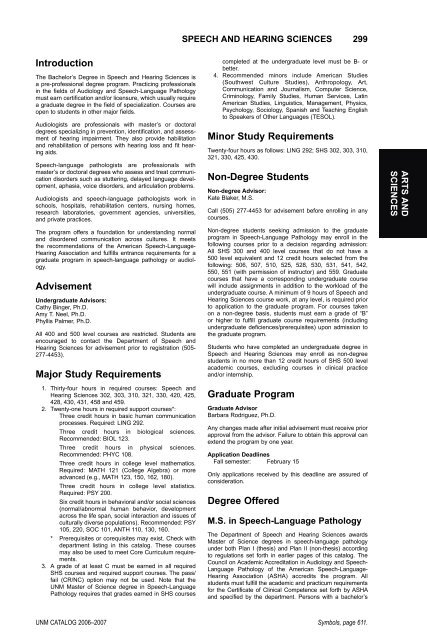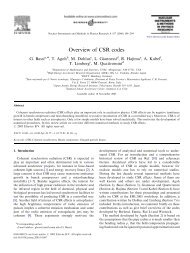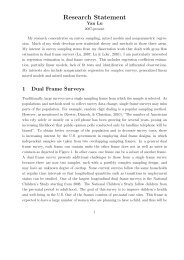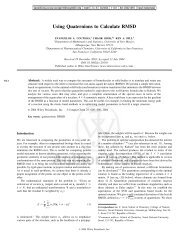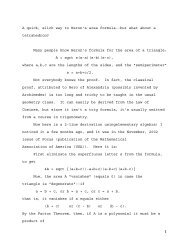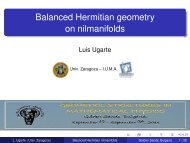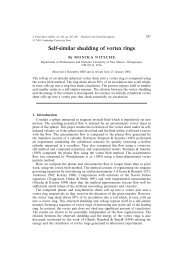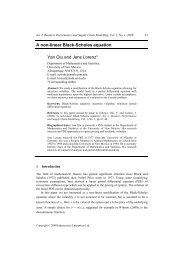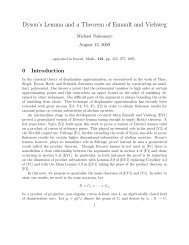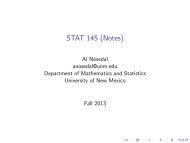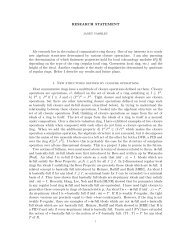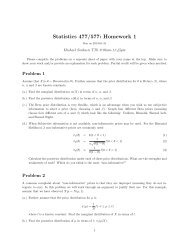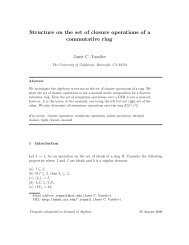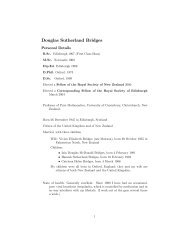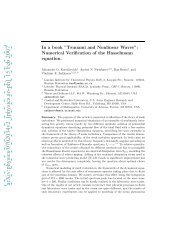OEO Office of Equal Opportunity - Department of Mathematics and ...
OEO Office of Equal Opportunity - Department of Mathematics and ...
OEO Office of Equal Opportunity - Department of Mathematics and ...
Create successful ePaper yourself
Turn your PDF publications into a flip-book with our unique Google optimized e-Paper software.
SPEECH AND HEARING SCIENCES 299<br />
Introduction<br />
The Bachelor’s Degree in Speech <strong>and</strong> Hearing Sciences is<br />
a pre-pr<strong>of</strong>essional degree program. Practicing pr<strong>of</strong>essionals<br />
in the fields <strong>of</strong> Audiology <strong>and</strong> Speech-Language Pathology<br />
must earn certification <strong>and</strong>/or licensure, which usually require<br />
a graduate degree in the field <strong>of</strong> specialization. Courses are<br />
open to students in other major fields.<br />
Audiologists are pr<strong>of</strong>essionals with master’s or doctoral<br />
degrees specializing in prevention, identification, <strong>and</strong> assessment<br />
<strong>of</strong> hearing impairment. They also provide habilitation<br />
<strong>and</strong> rehabilitation <strong>of</strong> persons with hearing loss <strong>and</strong> fit hearing<br />
aids.<br />
Speech-language pathologists are pr<strong>of</strong>essionals with<br />
master’s or doctoral degrees who assess <strong>and</strong> treat communication<br />
disorders such as stuttering, delayed language development,<br />
aphasia, voice disorders, <strong>and</strong> articulation problems.<br />
Audiologists <strong>and</strong> speech-language pathologists work in<br />
schools, hospitals, rehabilitation centers, nursing homes,<br />
research laboratories, government agencies, universities,<br />
<strong>and</strong> private practices.<br />
The program <strong>of</strong>fers a foundation for underst<strong>and</strong>ing normal<br />
<strong>and</strong> disordered communication across cultures. It meets<br />
the recommendations <strong>of</strong> the American Speech-Language-<br />
Hearing Association <strong>and</strong> fulfills entrance requirements for a<br />
graduate program in speech-language pathology or audiology.<br />
Advisement<br />
Undergraduate Advisors:<br />
Cathy Binger, Ph.D.<br />
Amy T. Neel, Ph.D.<br />
Phyllis Palmer, Ph.D.<br />
All 400 <strong>and</strong> 500 level courses are restricted. Students are<br />
encouraged to contact the <strong>Department</strong> <strong>of</strong> Speech <strong>and</strong><br />
Hearing Sciences for advisement prior to registration (505-<br />
277-4453).<br />
Major Study Requirements<br />
completed at the undergraduate level must be B- or<br />
better.<br />
4. Recommended minors include American Studies<br />
(Southwest Culture Studies), Anthropology, Art,<br />
Communication <strong>and</strong> Journalism, Computer Science,<br />
Criminology, Family Studies, Human Services, Latin<br />
American Studies, Linguistics, Management, Physics,<br />
Psychology, Sociology, Spanish <strong>and</strong> Teaching English<br />
to Speakers <strong>of</strong> Other Languages (TESOL).<br />
Minor Study Requirements<br />
Twenty-four hours as follows: LING 292; SHS 302, 303, 310,<br />
321, 330, 425, 430.<br />
Non-Degree Students<br />
Non-degree Advisor:<br />
Kate Blaker, M.S.<br />
Call (505) 277-4453 for advisement before enrolling in any<br />
courses.<br />
Non-degree students seeking admission to the graduate<br />
program in Speech-Language Pathology may enroll in the<br />
following courses prior to a decision regarding admission:<br />
All SHS 300 <strong>and</strong> 400 level courses that do not have a<br />
500 level equivalent <strong>and</strong> 12 credit hours selected from the<br />
following: 506, 507, 510, 525, 528, 530, 531, 541, 542,<br />
550, 551 (with permission <strong>of</strong> instructor) <strong>and</strong> 559. Graduate<br />
courses that have a corresponding undergraduate course<br />
will include assignments in addition to the workload <strong>of</strong> the<br />
undergraduate course. A minimum <strong>of</strong> 9 hours <strong>of</strong> Speech <strong>and</strong><br />
Hearing Sciences course work, at any level, is required prior<br />
to application to the graduate program. For courses taken<br />
on a non-degree basis, students must earn a grade <strong>of</strong> “B”<br />
or higher to fulfill graduate course requirements (including<br />
undergraduate deficiences/prerequisites) upon admission to<br />
the graduate program.<br />
Students who have completed an undergraduate degree in<br />
Speech <strong>and</strong> Hearing Sciences may enroll as non-degree<br />
students in no more than 12 credit hours <strong>of</strong> SHS 500 level<br />
academic courses, excluding courses in clinical practice<br />
<strong>and</strong>/or internship.<br />
ARTS AND<br />
SCIENCES<br />
1. Thirty-four hours in required courses: Speech <strong>and</strong><br />
Hearing Sciences 302, 303, 310, 321, 330, 420, 425,<br />
428, 430, 431, 458 <strong>and</strong> 459.<br />
2. Twenty-one hours in required support courses*:<br />
Three credit hours in basic human communication<br />
processes. Required: LING 292.<br />
Three credit hours in biological sciences.<br />
Recommended: BIOL 123.<br />
Three credit hours in physical sciences.<br />
Recommended: PHYC 108.<br />
Three credit hours in college level mathematics.<br />
Required: MATH 121 (College Algebra) or more<br />
advanced (e.g., MATH 123, 150, 162, 180).<br />
Three credit hours in college level statistics.<br />
Required: PSY 200.<br />
Six credit hours in behavioral <strong>and</strong>/or social sciences<br />
(normal/abnormal human behavior, development<br />
across the life span, social interaction <strong>and</strong> issues <strong>of</strong><br />
culturally diverse populations). Recommended: PSY<br />
105, 220, SOC 101, ANTH 110, 130, 160.<br />
* Prerequisites or corequisites may exist. Check with<br />
department listing in this catalog. These courses<br />
may also be used to meet Core Curriculum requirements.<br />
3. A grade <strong>of</strong> at least C must be earned in all required<br />
SHS courses <strong>and</strong> required support courses. The pass/<br />
fail (CR/NC) option may not be used. Note that the<br />
UNM Master <strong>of</strong> Science degree in Speech-Language<br />
Pathology requires that grades earned in SHS courses<br />
Graduate Program<br />
Graduate Advisor<br />
Barbara Rodriguez, Ph.D.<br />
Any changes made after initial advisement must receive prior<br />
approval from the advisor. Failure to obtain this approval can<br />
extend the program by one year.<br />
Application Deadlines<br />
Fall semester: February 15<br />
Only applications received by this deadline are assured <strong>of</strong><br />
consideration.<br />
Degree Offered<br />
M.S. in Speech-Language Pathology<br />
The <strong>Department</strong> <strong>of</strong> Speech <strong>and</strong> Hearing Sciences awards<br />
Master <strong>of</strong> Science degrees in speech-language pathology<br />
under both Plan I (thesis) <strong>and</strong> Plan II (non-thesis) according<br />
to regulations set forth in earlier pages <strong>of</strong> this catalog. The<br />
Council on Academic Accreditation in Audiology <strong>and</strong> Speech-<br />
Language Pathology <strong>of</strong> the American Speech-Language-<br />
Hearing Association (ASHA) accredits the program. All<br />
students must fulfill the academic <strong>and</strong> practicum requirements<br />
for the Certificate <strong>of</strong> Clinical Competence set forth by ASHA<br />
<strong>and</strong> specified by the department. Persons with a bachelor’s<br />
UNM CATALOG 2006–2007 Symbols, page 611.


